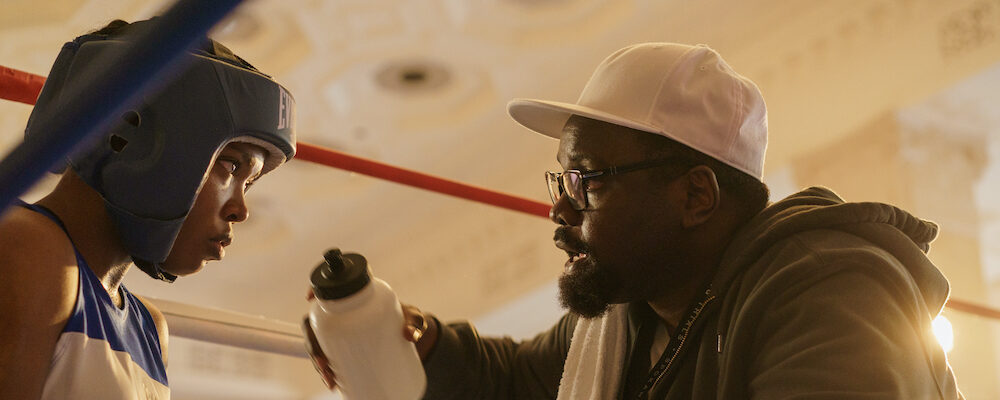‘The Fire Inside’: The Story of Boxer Claressa Shields’ Rise Is a Sobering Look at Overcoming Adversity Beyond the Ring
Alci Rengifo
There are underdogs and then there are underdogs who truly have all the cards stacked against them. Boxer Claressa “T-Rex” Shields was born with talent and in the least favorable conditions to foster it. “The Fire Inside” stands out as a sports film by giving Shields’ life in Flint, Michigan real focus above all the boxing clichés. This is an assured directorial debut for Rachel Morrison, a cinematographer who has lensed major dramas and blockbusters like “Black Panther.” For Shields’ story, she displays strong grit along with a welcome humanity. The characters don’t feel like overhyped figures designed to cheer for. Their struggles are so familiar and grounded that winning to survive feels more urgent than simply beating an opponent.
Morrison begins the story in Flint in 2006 when 8-year-old Claressa (Jazmin Headley) walks into a boxing gym to meet volunteer coach Jason Crutchfield (Brian Tyree Henry). He is skeptical at the sight of a young girl wanting to box but soon enough sees her potential. At home, Claressa’s life is marked by a mother, Jackie (Olunike Adeliyi), consumed with drinking and hanging around with the wrong crowd. Claressa and her siblings can go an entire day without eating. Despite all this, by the time Claressa (now played by Ryan Destiny) is in high school, she is ready to compete for a spot in the 2012 London Olympics. As a young Black American, Claressa faces multiple challenges ranging from competing against older, better-trained opponents, worrying about her family and overall public misconceptions about women in boxing.
Morrison works with a screenplay penned by Barry Jenkins, the acclaimed director of “Moonlight” and “If Beale Street Could Talk.” Jenkins’ script carries some of the story arcs we tend to expect in a sports drama but scaled down to human level. It should be common knowledge that success is rarely attained without help, but “The Fire Inside” is precisely about how even with plenty of support, someone from an underrepresented community has to outmaneuver an entire world of roadblocks. Claressa’s raw talent isn’t always enough. Jason himself is taking a major gamble by supporting her. His coaching gig is unpaid and he supports his wife and kids as a cable repairman. Played with great warmth and no-nonsense snap by Bryan Tyree Henry, Jason is one of those examples of the kind of mentor some are lucky to find, who are themselves shockingly underappreciated. A trainer like him has to do it from the heart, since his work in the gym is not his livelihood. When Claressa goes to China for a qualifying fight, he can’t make it because flying there is too expensive.
There is the excitement of a classic sports movie when Claressa gets to make her debut in the boxing world, intimated when faced with major opponents like England’s Savannah Marshall (Nicole Drury), who becomes a specter haunting her ambitions. Morrison doesn’t linger too much on these elements. The focus keeps shifting back to what truly matters about Claressa’s journey. She hails from a working class Black American background. Jason tries to keep her focused and away from the pitfalls of getting swooned by the wrong boys or worse. When asked in China what she likes about boxing Claressa has no qualms saying, “I like to beat people up.” Publicist Nicole Thompson (Sarah Allen) then has to illuminate her on the ways of commercialism. She educates Claressa on how women athletes are cornered to look feminine and not “like a bully.” The young boxer is surprised to see another competitor forced to do a corny photo shoot the day before a fight, as female athletes make less than male athletes. Morrison clearly connects with this angle of the story as a female filmmaker who has no doubt faced obstacles in a male-dominated industry.
Real life is so much more complicated than feel-good fiction. When Claressa wins gold in London the cliché assumption would be that her life is now set. The reality is the film’s harshest indictment of our sports culture. Expected endorsements fail to materialize and the economic situation at home stays about the same. Agents tell Jason the problem is there is little profit in women who participate in such a macho sport. Such a claim seems absurd, but society has a way of being utterly blind to common sense. In Flint, Claressa becomes a local hero for representing her hometown, yet that doesn’t necessarily translate to financial gain. The worth of a gold medal suddenly feels so small. A powerfully heartbreaking moment finds Claressa wandering a supermarket while holding her nephew and coming across cereal boxes plastered with the faces of white Olympic athletes.
Ryan Destiny and Brian Tyree Henry are one of the best pairs in this sort of movie since the pairing of Clint Eastwood and Hilary Swank in “Million Dollar Baby.” Theirs has the feel of a father-daughter relationship combined with the drive to achieve a dream. Claressa Shields would eventually return to even greater Olympic glory, get those endorsements and help define modern women’s boxing. Luckily, there is a happy ending to this story, but that is not always the case. “The Fire Inside” is inspirational by reminding us that achievement is a difficult, two-way street. It takes immensely hard work, yet the destination is not always the one we expect. The risk is much greater when you have few resources. For women and other underrepresented groups, the struggle is even more difficult because it means defying entrenched prejudices. The wider struggles in the subtext of this movie become even more meaningful than the sport.
“The Fire Inside” releases Dec. 25 in theaters nationwide.

